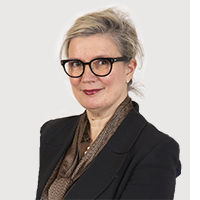
Why did you organize a bootcamp examining our clients’ expectations in the middle of a health crisis?
Isabelle Fondimare : This crisis has disrupted economic stability and development in an unprecedented way. It was vital for us to contact our clients very quickly, in order to keep up with their changing needs. We assumed certain things about our clients which were sometimes not the case. They expected other solutions from us. We understood that it was absolutely necessary to nurture that proximity, as their demands were evolving as quickly as the situation. A global approach was needed, supported at the same time by local feedback via BUs.
What makes this bootcamp exceptional?
IF : Necessity was the mother of invention. How could we create a meeting place for comparing experiences when travel was prohibited? In the past, we had organized physical bootcamps to co-construct services with our clients. During the health crisis, we participated in a virtual event organized by the Innovation Department. We merged these two experiences to create a virtual bootcamp for co-constructing services based on the expectations of our clients. And, paradoxically, the crisis helped us: this bootcamp was able to be organized in a record time of one month. For comparison, a physical bootcamp for 250 participants with 20 breakout rooms requires two or three months’ preparation.
What were clients’ expectations in the midst of a crisis?
IF : Client expectations have proven to be very divergent, changing, unprecedented and different from one country to the next. Indeed, the situations are completely different between Italy and Germany, Austria and Brazil. Similarly, it was impossible to provide a standard response to clients who had to stop their activity (such as hotels, cultural leisure facilities, airports), those that experienced a decline in activity (such as the automotive industry) and those which saw an increase in activity (such as hospitals and the pharmaceutical industry). We launched this initiative which revisits all our client listening exercises.
Has ENGIE’s relationship with its partner clients changed?
IF: The crisis highlighted the importance of certain activities which, if interrupted, could have made the situation untenable. At the same time, the ENGIE Group and its energy services found itself at the center of critical operations for its clients, including data centers, hospitals, telecom operators and the food industry. We helped them maintain service continuity in circumstances where it could have been threatened. We helped other types of clients to better manage the flexibility of their production and anticipate work already scheduled for completion.
For a number of them, we were already a strategic partner. This crisis showed us that our destinies were linked.
Is there a before and after in relation to ENGIE’s client-centricity?
IF: here is a before and after and there will also be an after-after. This approach of listening to our clients allowed us to clarify, firstly, what related to unchanged expectations and, secondly, what related to new expectations as a result of the crisis. For example, being able to manage large visitor flows in public places while complying with health regulations or certifying that air-conditioning solutions meet new health requirements.
Initially, the ENGIE BUs ensured service continuity and worked on restarting activities after lockdown. We then looked into ways of sharing our feedback and the good practices that emerged at local level, in BUs.
Although the situation is difficult to anticipate for everyone, including our clients, their new expectations in terms of responsiveness, flexibility and reliability will now require continuous synchronization within very tight time-frames. To meet these expectations, we will have to make further progress in terms of listening to them and the modularity, agility and adaptability of our services, all on demand.


